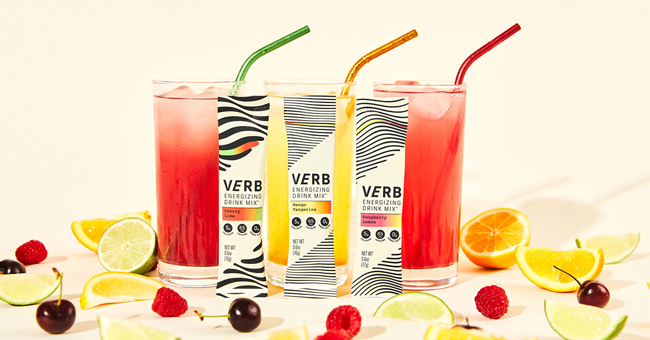Many food and beverage makers often look to adjacent categories for their first brand extension. However, caffeinated bar maker Verb is making a larger leap for its first foray beyond bars: EDM, which stands for Energizing Drink Mix (not electronic dance music). The new line promises consumers a jolt of energy from caffeine, not a bass drop.
Verb’s expansion into drink mixes follows the close of a previously unannounced $8 million funding round earlier this year, which will support the brand’s move into energizing food and beverage products.
The funding round included investment from Melitas Ventures, Valor Siren Ventures, CircleUp Growth Partners and returning investor Global Founders Capital. The latest funding round follows seed rounds in 2019 and 2018 and brings Verb’s total capital raised to date to approximately $13 million.
Verb’s flagship energy bar line, first launched in 2018, recorded a 300% increase in sales last year. Verb co-founder and CEO Matt Czarnecki said the growth gave the brand confidence that there was an unmet consumer need for energy products. The company settled on drink mixes after conducting consumer research and launched its Energizing Drink Mix — in Raspberry Lemon, Mango Tangerine and Cherry Lime flavors — for $19.95 per 12-pack. The line will initially be sold direct-to-consumer via Verb’s website.
“We conducted thousands of surveys and hundreds of in-person interviews with our customers and realized that this was a real need state for lots of people and a product category that we felt we could really disrupt,” Czarnecki said.
The allulose-sweetened mixes contain five grams of collagen, B vitamins and 65 grams of caffeine from organic green tea. This caffeine content, in line with its energy bar line, is relatively low compared to similar offerings from Nuun, Hydrant and Liquid I.V., which range from 80 to 100 mg. Czarnecki said the caffeine content is intended to create a “balanced energy effect” that many energy drinks don’t offer, while also containing no added sugar. Although the move from bars to energy drinks seems like a significant shift for Verb, the line helps the brand reach more consumers as a direct competitor to other caffeinated food and beverage offerings, rather than just bar brands, he added.
“Really from Day One, we’ve strived to become a holistic energy brand and to help our customers live vibrant and energized lives,” Czarnecki said. “When we look at the competitive set, we’re looking at brands like Red Bull and 5-hour [Energy] and Celsius, and less so brands like Clif.”
Additionally, the new funding will go toward growing Verb’s 30-person team, which is relocating this summer from Boston to New York City. The company also plans to invest in research and development to expand its EDM line and launch new offerings. While its current products all contain caffeine, Czarnecki said the brand’s mission is about “more than just caffeine” and will offer products with different benefits and functionalities in the future.
The direct-to-consumer channel will remain the brand’s focus for the time being, having benefited them during the pandemic, when in-store bar sales declined. Czarnecki credits this growth not only to shifting consumer shopping behaviors during the pandemic but also the close connection the brand has formed with its consumers through a text commerce platform, social media following and subscriber base.
“It’s one thing to test [products] in the kitchen, but it’s a completely different thing to put them out into the real world,” Czarnecki said. “We feel that by having super direct relationships with our customers, we can actually iterate and improve upon a product from the get go.”
